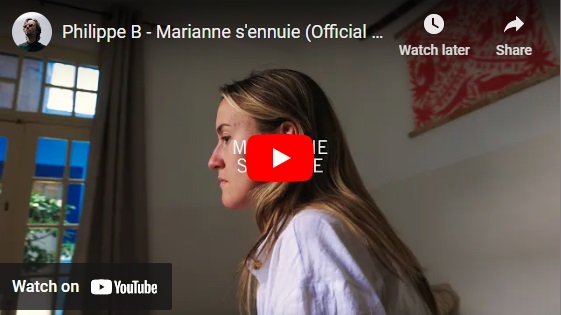Exactly six years after La grande nuit vidéo, Philippe B is releasing Nouvelle administration, an album on which he’s recognizable in every story and melody – or just about. The singer-songwriter is back with everything people always loved about him: a malleable, fictionalized “self,” in which one ends up seeing one’s true self, at some level.
 “I love the irony of a restauant that changes owners, and you can read the large sign that says Under New Ownership, but the soup continues to be made by the same dude,” says Philippe B, explaining the title of his second album. The restaurant’s menu hasn’t changed through his entire life; what’s changed is life itself. Becoming a father a year before the start of the pandemic, Mr. B wrote all of the words and music of Nouvelle administration inside a new family dynamic, one that modified the album’s main theme.
“I love the irony of a restauant that changes owners, and you can read the large sign that says Under New Ownership, but the soup continues to be made by the same dude,” says Philippe B, explaining the title of his second album. The restaurant’s menu hasn’t changed through his entire life; what’s changed is life itself. Becoming a father a year before the start of the pandemic, Mr. B wrote all of the words and music of Nouvelle administration inside a new family dynamic, one that modified the album’s main theme.
“This album is about Philippe B writing in the style of Philippe B during the pandemic,’ he says. “I wasn’t trying to re-invent myself, but instead [I was] in the process of checking whether I still existed.” The similarities between the new and the old pieces were reassuring in the context of isolation. “The fact that my character, i.e. myself, had changed after becoming a dad was renewal enough for me,” says B. “Those are songs that say something more, and I managed to control my normalcy.”
As the boss of the new administration, B built everything himself. Guido del Fabro (violins), Émilie Laforest (voice), José Major (drums) and, in this case, Philippe Brault (bass) join the singer-songwriter, who takes care of the arrangements, mixing, and production. “It was the first time I was also looking after the mixing,”he says. “Guido was my second ear for everything. He came along rather late in the process, but I gave him that responsibility. He can adjust the frequecencies, and the arrangements, and the words, all at once. Above all, he knows me inside-out.”
Becoming a parent can change a life, and that change can be felt throughout the album. “For a long time, we were stuck in a place where I meant me, and you meant my girlfriend, or some other character,” says B. “But since my daughter was born, we is a threesome, and you is a duo.” That’s the case with ‘Les filles,’ a song depicting the whole range of anguishing thoughts, large and small, that can haunt a vulnerable man, who realizes the possible pain that he might inflict on the very people he’s trying to protect.
Outside of his personal life story, two stories took shape in spite of the fact that they’re not being “played” by his character: “Marianne s’ennuie” and “Souterrain.” In the first one, B chooses to tackle the idea of polyamorous love, and all the possibilities that lie behind the “love” concept.
“The chosen name is Marianne, Leonard Cohen’s girlfriend,” says B, adding that he didn’t want to shape this story too clearly, either. “I wonder how Marianne would have faced that sort of aggressiveness today,” he says. “She was Cohen’s muse, and their long-distance love had several peculiarities, although in the end the pretty things that one heard in the songs all came from him. I acted as if, for once, one were passing the mic to her.”
The story of “Souterrain” was written in the peculiar ambience of Sophie Dupuis’ 2020 film. “To keep my brain active during the pandemic, my record company offered me, and some others, a project that represented a false order, as if we had to write a song that would be the film’s credit,” says B.
Nouvelle administration took its time coming out, and many other songs of the album took life multiple times. “I would write them, and allow enough time for me to forget about them,” says B, “before coming back to them, re-discovering them, and making sure I still liked them.” He adds that he’d adopted a creative process that made him feel “more lonely than ever before.”
At the end of the album, “L’ère du verseau” brings a conclusion to the 10 stories – unrelated ones, in spite of the songwriter’s intention of wanting to stick to his main theme of fatherhood. “Talking about your new family is a nice thing, but turning it into songs sounds a bit cheesy,” says B with a laugh. “I also wanted to make sure that a guy who has zero children could come up with his own interpretation. I wanted to go back to Philippe the chameleon, who can be just about anybody. I think, or least I hope, it worked.”
